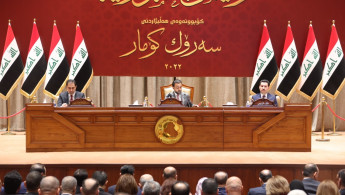Iraq MPs to vote on new government as some posts remain vacant
Iraqi lawmakers are due to meet on Thursday to take part in a confidence vote for the new Iraqi government, with appointments to some posts not decided just hours before the vote takes place.
Prime minister-designate Mohammed Shia al-Sudani was chosen earlier this month to form a new government following months of infighting between key Shia Muslim factions, promising a "strong, capable" government.
An official statement from the Iraqi parliament released on Wednesdaysaid the confidence vote was set to begin at 11:00 am local time on Thursday. Sudani and his cabinet need an absolute majority from the 329-seat parliament.
Muhammad al-Sihoud, an MP from the pro-Iran Coordination Framework, told The New Arab's Arabic-language sister site Al-Araby Al-Jadeed that most government roles, though not all, had been decided on.
"There are some differences over a few portfolios and some candidates, and the dialogue will continue until a few hours before the parliament session," Sihoud said.
Voting on some posts could be postponed to a later session, he added.
The nomination on 13 October of Sudani - who is from the Coordination Framework, an umbrella group of pro-Iran political parties - raised hopes of an end to a year of political deadlock in place since Iraq's last election.
But the process of forming a new government has been beset with difficulties, including refusals by some political blocs to join the government.
Muqtada al-Sadr, a Shia cleric who leads the Sadrist movement, which won the most seats in last October's election and opposes the Coordination Framework, said his organisation would not join the government.
In another development, demonstrators took to the streets of Baghdad on Tuesday to mark three years since the start of the anti-corruption popular protest movement which began with large-scale street demonstrations at the beginning of October 2019.
That protest movement had seen demands for an end to the sectarian power-sharing system, adopted in Iraq in the aftermath of the 2003 US-led invasion. Cabinet posts are shared between Iraq's ethnic and confessional communities.
Some prominent members of the protest movement ran in last October's elections and won parliament seats.
To hold Iraq's political elites to account, the MPs said they would not join the government and instead form an opposition coalition.
Basem Khashan, an independent MP and former activist told Al-Araby Al-Jadeed: "The Coordination Framework... is repeating previous experiences in all governments, by adhering to partisan and sectarian quotas."
The confidence vote had been initially planned for last Saturday, but was postponed amid haggling over the allocation of cabinet posts, according to lawmakers.
Agencies contributed to this report.





 Follow the Middle East's top stories in English at The New Arab on Google News
Follow the Middle East's top stories in English at The New Arab on Google News


